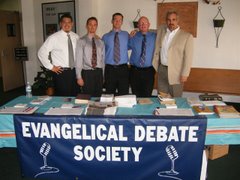by Ed Enochs
Chairman,
The Evangelical Debate Society
"For in Him we live and move and have our being" (Acts 17:28).
Anomaly: Deviation or departure from the normal or common order, form, or rule.
"In the beginning was the Word and the Word was with God and the Word was God. He was in the beginning with God and all things that came into being through Him and without Him nothing has come into being that has came into being" (John 1:1-3).
"He is the image of the invisible God, the firstborn over all creation. For by Him all things were created that are in heaven and that are on earth, visible and invisible, whether thrones or dominions or principalities or powers. All things were created through Him and for Him. And He is before all things, and in Him all things consist. And He is the head of the body, the church, who is the beginning, the firstborn from the dead, that in all things He may have the preeminence" (Colossians 1:15-18).
God, who at various times and in various ways spoke in time past to the fathers by the prophets, has in these last days spoken to us by His Son, whom He has appointed heir of all things, through whom also He made the worlds; who being the brightness of His glory and the express image of His person, and upholding all things by the word of His power, when He had by Himself purged our sins, sat down at the right hand of the Majesty on high, having become so much better than the angels, as He has by inheritance obtained a more excellent name than they" (Hebrews 1:1-4). In the howling, swirling wasteland of spiritually bankrupt Postmodern Americana, Almighty God has spoken with final authority in His inerrant, infallible, inspired, self- authenticating and perfect Word and in the Logos of God: Jesus Christ, who was send by God the Father to die on the cross and rise again from the dead in order to give us eternal life.
From the moment of our conception until the point of our final expiration, we are being incessantly bombarded by secular society with two seemingly idiosyncratic contradictory ideologies or world -views. These beliefs or structural or behavioral characteristics peculiar to an individual or group, the German Philosophers classified by the lexical moniker, Weltanschauung, or the overall perspective from which one sees and interprets the world and the collection of beliefs about life and the universe held by an individual or a group.
The twin simultaneously contradictory weltanschauungs or world-views that both govern and permeate secular Western Civilization are Modernity with it's overt reliance on scientific progress and human ingenuity and Postmodernity, which postulates absolute ethical and propositional relativism have one thing in common: They both reject the Historic Christian conception of the uniqueness and exclusivity of Jesus Christ over all other ideological reference points and socio-religious options. Modernity, with its reliance on the scientific method, postulates the secularist / naturalist view that we live in a closed system of cause and effect and that nothing happens outside of the natural laws of physics.
Thus, the miraculous and supernatural Jesus as found in Holy Scripture has no place in the modern mind, since miracles are an impossibility.In the Postmodern framework, Jesus has been reduced to just another irrelevant teacher amongst many religious leaders, gurus and shaman and His special role as the Son of God who was sent by God the Father to die for the sins of humanity has been rendered obsolete...However, the Jesus Christ of Holy Scripture is truly an Anomaly, who transcends the fallen and darkened schema of sinful and depraved men and has been send via the will of God the Father, into actual time-space history to accomplish the divine plan of salvation. Jesus Christ truly transcends and breaks into all our worldly systems, revealing to us the glory of God, culminating the grand divine historical-redemptive event: the Cross of Jesus Christ.The Cross of Jesus Christ is what brings us to God..."But God demonstrates His own love towards us, in that while we were yet sinners, Christ died for us" (Romans 5:8)."For God made Him, who knew no sin to become sin for us, that we might become the righteousness of God" (2 Corinthians 5:21)."For Christ also suffered once for sins, the just for the unjust, that He might bring us to God, being put to death in the flesh but made alive by the Spirit" (1 Peter 3:18).
